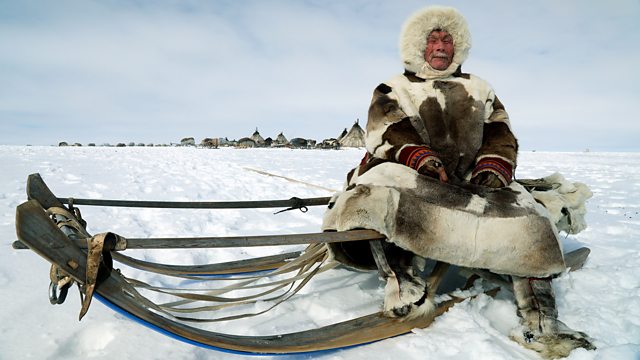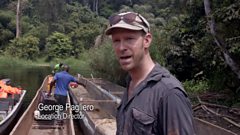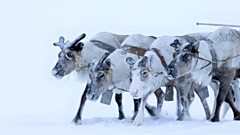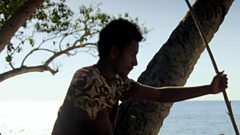
Surviving with Animals
In many of the earth's natural wonders, animals can be a threat to the people who live there or they can provide a means of survival.
In many of the earth's natural wonders there is an abundance of animals. These can be a devastating threat to the people who live there, or they can provide a means of survival, but often at a high price.
In the coastal salt marshes of northern Australia's Arnhem Land, Indigenous Australians still go hunting for the eggs of one of the world's most aggressive predators - the saltwater crocodile. Following a hunting ban their numbers are recovering well, and the local rangers, like Greg Wilson, are licensed to take a quota of eggs to supply the region's commercial crocodile farms. Despite their ancient hunting skills, this remains a dangerous job - a croc could always be lurking nearby, protecting its nest.
The Yamal Peninsula in northern Siberia is a frozen environment stretching deep into the Arctic Circle. Known to local nomadic peoples as the edge of the world, temperatures can reach minus 50 degrees Celsius or lower in the depths of winter. Very few animals can live here, but one that can is the reindeer. Adapted to survive on a diet of lichen, the reindeer in turn enable people to survive. For thousands of years the Nenets people have survived by following these herds, in a symbiotic relationship that benefits both people and animals. For 65-year-old reindeer herder Medko Serotetto the journey is becoming harder than ever, as climate change makes weather patterns increasingly unpredictable.
Vanuatu is an island paradise in the south Pacific, but life here isn't perhaps as idyllic as it appears. Overfishing has reduced fish stocks, making food harder to come by for the indigenous islanders like 45-year-old Nigasau. The islanders are dependent on fish for their food, as there is little arable land or wildlife on the islands, but the catch is falling further with every year that goes by. Nigasau's 15-year-old son Misakofi is learning his trade as a fisherman and faces his greatest test - freediving at night to catch highly prized lobster. All around the world, as animal populations decline, life is becoming tougher for the indigenous people who depend on them.
In other parts of the world, it is living space that is in short supply. For countless years, elephants of north east India have migrated around the forests in the Himalayan foothills and lived in the plains of Assam. The growth of Assam's famed tea plantations has led to an influx of workers, some of whom have made their homes on the ancient elephant migration routes. Conflict is hard to avoid, especially when the elephants are drawn to the villages by the smells of food and palm toddy. The elephants themselves are a protected species, and it is illegal to harm them, but survival for them too is becoming ever harder.
Last on
More episodes
Clips
-
![]()
Siberian Reindeer
Duration: 01:20
-
![]()
Vanuatu
Duration: 01:36
Music Played
Timings (where shown) are from the start of the programme in hours and minutes
-
![]() 00:42
00:42Mano
Lost Paradise Part1
Credits
| Role | Contributor |
|---|---|
| Series Producer | Jobim Sampson |
| Director | Russell Leven |
| Executive Producer | Jane Aldous |
Broadcasts
- Wed 21 Feb 2018 21:00BBC One except Northern Ireland & Northern Ireland HD
- Sun 25 Feb 2018 17:05BBC One except Scotland & Scotland HD
- Thu 15 Mar 2018 08:00
- Thu 13 Sep 2018 23:45BBC One except Northern Ireland & Northern Ireland HD
- Fri 14 Sep 2018 00:20BBC One Northern Ireland HD & Northern Ireland only
- Sun 17 Feb 2019 16:15BBC Two except Scotland & Wales
- Sat 4 Jul 2020 20:00
- Sun 5 Jul 2020 02:15
- Thu 23 Jun 2022 19:00
- Fri 24 Jun 2022 01:10
- Sat 14 Jan 2023 16:30BBC Two except Scotland
- Wed 26 Jul 2023 15:45BBC Two except Scotland




